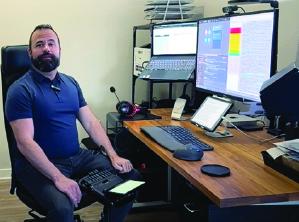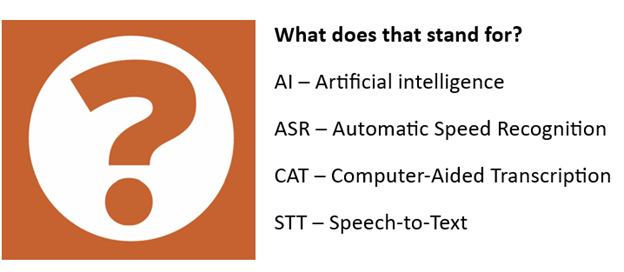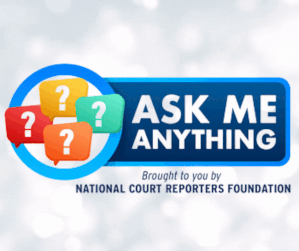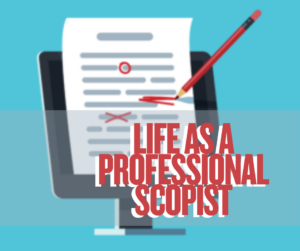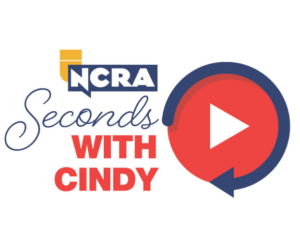By Mike Hensley
No matter how you view it, technology persists, and it often prevails. We hear the question more frequently in our work with each new advance that comes into view. Technology has advanced rapidly and, while tools like speech-to-text (STT) AI may seem appealing, they lack the irreplaceable trust and reliability of stenographers and here is why.
Fides is the Latin word for trust. You know it already from phrases like bona fide (meaning in good faith) or Semper Fidelis (meaning always faithful). Trust is incredibly valuable and equally fragile. Once broken, it is nearly impossible to repair fully. For centuries our profession has been trusted to accurately capture the spoken word to be preserved for the generations who follow. Our ability to capture testimony in sworn proceedings is the mechanism that holds all parties accountable in the eyes of the law. If someone provides inconsistent testimony while under oath, their credibility — and our trust in them — is damaged. This is the core purpose for why we strive to capture proceedings with the highest level of accuracy, down to the most nuanced comma.
Just as trust is essential in the courtroom, it is also the foundation of how we advocate for our role as court reporters. We need to think deeply about the situation we face so that we can be prepared to discuss this matter thoughtfully and thoroughly. This is much like what we have done in learning the practice of stenography. We have already learned a highly complex system of writing to capture the spoken word quickly regardless of the circumstances. We are well positioned to study our opponents and consider their strengths and weaknesses so that we can highlight our own.
Technology can be transformative
To understand why trust is so critical in our work, consider how early humans approached one of the most transformative technologies in history: Fire. Imagine how primitive humans must have felt when fire first was discovered. The initial reaction may have been fear of this powerful and uncontrollable wonder. Yet there was a deep-down curiosity that drove us to learn more about this stranger. Eventually, we learned that fire could do more than just burn or damage. It can heal. It can solder. It can create. It can cleanse. Fire can do so many wonderful things when it is used safely and properly. Fire still can burn and cause harm when it is uncontrolled or used maliciously. However, we now have a deeper and broader understanding of how to use fire safely and effectively. Because of this, our species discovered many ways to thrive.
Technology will continue to innovate. This flows directly from the human spirit for exploration, creativity, and problem-solving. If we cross our arms and stomp our feet when technology is discussed, we become the figurative boulder in the river. Notice how the river continues to flow around the boulder. Eventually, the river will soften the ground around the boulder, causing it to sink and ultimately become overpowered by the flow of the surrounding water. We must behave like a raft upon the river. The raft flows along the path of the river, using the power of water for its own purpose of transportation. The two exist together, each accomplishing their own task and supporting each other simultaneously.
When faced with a curious inquiry as to whether stenographers are needed, we cannot take a one-sided approach with the response, “We are the gold standard. Of course we are better.” We must communicate in specific detail the exact reasons why and in a way that addresses the needs and concerns of our clients and consumers.
With our understanding of trust and adaptability, we can break down the specific reasons why we are without a doubt the best choice for legal transcription and speech-to-text conversion.
Why are stenographers better?
Ah, the good part. We love ringing our own bell and singing our own praises. And we should! We have worked hard to earn our skill, and we continue to strive for improvement and mastery. Here are the bullet points to bear in mind when pointing out our strengths:
- Stenographers excel in understanding accents, dialects, and colloquial variances.
- We can work through difficulties such as unexpected background noise or interruptions.
- Stenographers adapt in real time to ensure accuracy, even in chaotic situations, with an instantaneous “verify and clarify” method.
- Our humanity allows us to discern tone and intent for instant contextual understanding, especially with emotionally charged speakers.
- We can self-regulate and self-correct in times where we make an error.
- We are accountable for the accuracy of our final product.
If you were to use those six bullet points as they are, you would make a convincing argument in our favor. Unfortunately, we are in the era where information comes quickly and in small, powerful pieces. To be ready with your response, consider using the acronym HUMAN to remember the list above:
- H – Hear with understanding
- U – Understand context
- M – Maintain accuracy
- A – Adapt in real time
- N – Navigate challenges
Think of times when you needed to step in and clarify something on the record that could have significant impact if it were incorrect. Do you need an example? What if your deponent were asked a critical question upon which the outcome of the case would be decided. The answer given sounded like, “I don’t know.”
Does your speaker lack the ability to recall the information? Or is your speaker emphatically denying participation? Suppose their answer was meant to be, “I do not. No.”
By asking for clarification, we ensure that the intent of the speaker was accurately recorded thus preserving the integrity of the record.
Reflecting on situations like these can be a starting point for your own preparation. Explore your own means to gather and organize the information you will need so that you have it on hand and ready to share eagerly and enthusiastically when the moment appears. This will also help you to keep dialogue open and purposeful. When we engage with others, we remain at the table for the discussion. So what do you do if the conversation goes further?
Depending on the conversation, you can choose to discuss either the risks of relying on machines to do our jobs or how AI can complement our expertise without replacing it.
The risks of AI in the legal space
If AI is so advanced, what is stopping it from replacing court reporters now? Fortunately, we have resources already available that explain these risks in detail. If you have not read it yet, go now and read NCRA’s white paper “Emerging Ethical and Legal Issues Related to the Use of Artificial Intelligence (AI), Automatic Speech Recognition (ASR), Voice Cloning, and Digital Audio Recording of Legal Proceedings.”
For our friends who want the TL/DR (too long, didn’t read) version, here is a short list of some of the troubles with AI in the legal space:
- AI or STT engines struggle with homophones, number figures, overlapping speech, and complex nuances of language such as slang.
- If the audio recording is not sterile and pristine, machines fail. Accuracy metrics drop significantly when the audio involves diverse accents, dialects, or non-standard speech patterns.
- AI systems gather and store information in the cloud which presents significant vulnerability to breaches in security and confidentiality.
- Machines cannot understand nonverbal cues inherent to legal proceedings such as knowing when to swear in a witness, identifying the beginning of an examination, marking exhibits, or recognizing when a discussion is meant to be off the record.
The human approach to court reporting ensures accuracy, fairness, and trust – qualities no machine can replicate.
“But court reporters are so expensive.”
While it does appear initially that using a court reporter can be a costly service, the hidden costs of using AI — because of its pitfalls — can lead to consequences with significant harm or even irreparable damage. These unexpected expenses can far exceed the investment in a skilled professional.
- Transcripts created from STT engines still require editing, often from multiple reviewers. This also opens the door for unauthorized access to information meant to be safeguarded by confidentiality.
- Entire cases might have to be retried or reconstructed if audio systems fail to preserve testimony that was never transcribed. Imagine the overwhelming difficulty of trying to reconstruct an entire trial. Or worse, what do you do if any of your crucial witnesses are no longer able to testify for any number of reasons?
With accurate transcripts from a single professional, costly mistakes and retrials can be avoided entirely.
Where can AI be appropriately used?
By recognizing what AI is really meant to accomplish, we can harness it in ways that augment our skills and focus our talents where they are most valuable. AI is hardly “intelligence” at all. It is more accurately characterized as “machine learning.” The systems are limited by their training with the data that is given to them. They cannot yet draw inferences or creatively piece together ideas for spontaneous, novel content. AI, Chatbots, STT — all these tools can be used for tasks that are mundane, tedious, or often difficult to even get started.
In fact, we already use artificial intelligence tools every day as court reporters. If you have ever used spellcheck, then you are using AI. We also use this in our CAT systems when we invoke suggestions for globals of steno outlines or even brief forms for commonly used words and phrases. We also use technology to streamline the production process with automatic indexing. We have found ways to harness this technology to serve our needs. It allows us to use our skills effectively and efficiently. By advocating for tools tailored to our profession, we can ensure that technology supports, and does not replace, our unique expertise.
The human approach to court reporting ensures accuracy, fairness, and trust — qualities no machine can replicate. Let us champion this message in every conversation we have. Every interaction is an opportunity to share our pride and love for our profession. There is a reason that we have persisted for centuries. If we continue to grow, evolve, and adapt, we will keep our place to serve the people who need us. We have a sacred duty, and we will not take lightly our charge to capture the spoken word and to protect the record ensuring justice and equality for all.
Mike Hensley, RDR, is a freelance court reporter based in Dublin, Calif. He can be reached at mike@mphsteno.com.
